May 3: International Press Freedom Day
These journalists fled to Belgium: ‘I will continue to write, document and speak’
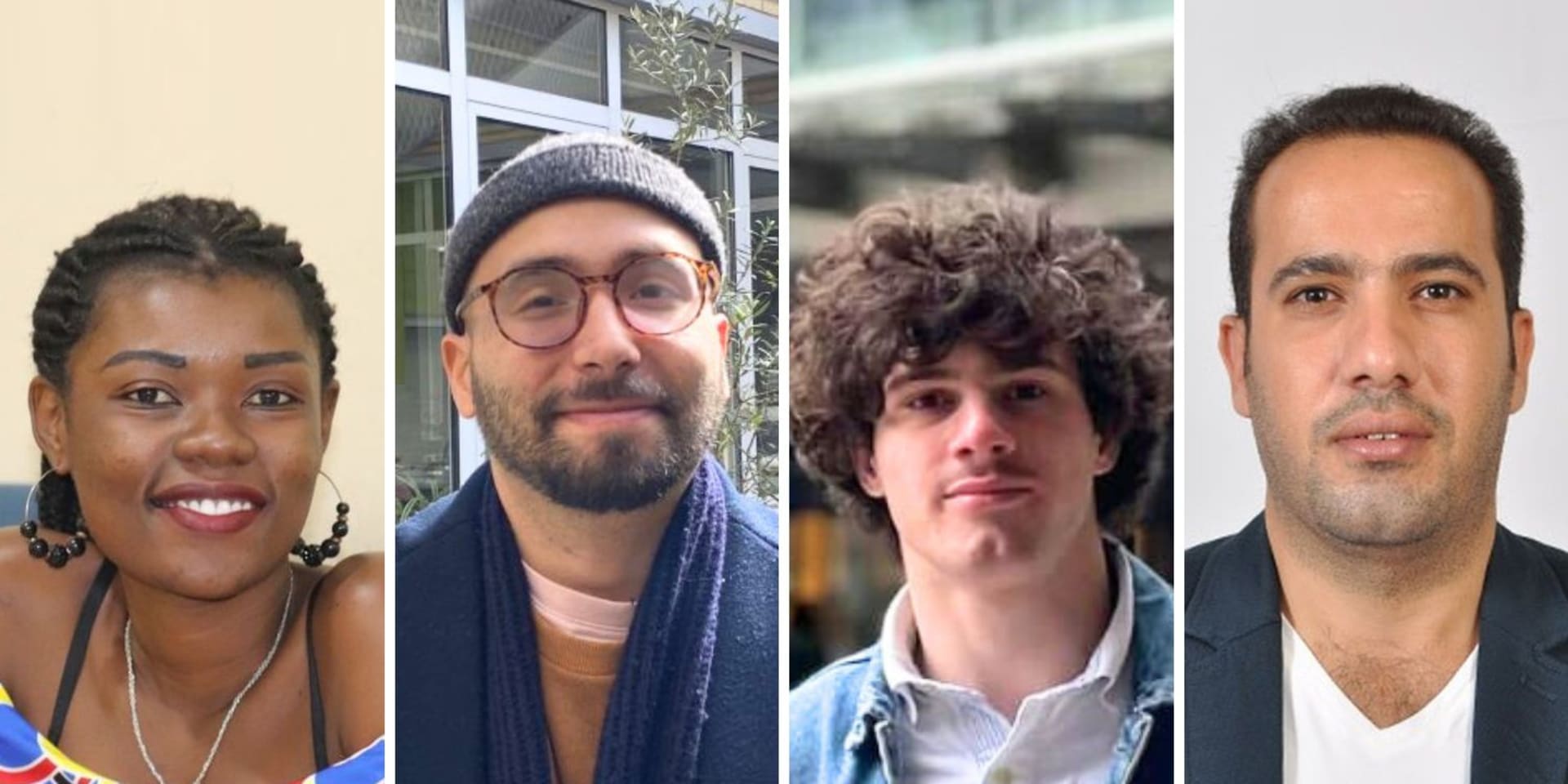

Myrthe Higgins
12 May 2025 • 20 minutes reading time
Press freedom seems less and less obvious. More and more journalists are in serious danger because of the work they do and have to flee their country. On International Press Freedom Day, we featured four refugee journalists who refuse to remain silent despite everything.
This article was translated from Dutch by kompreno, which provides high-quality, distraction-free journalism in five languages. Partner of the European Press Prize, kompreno curates top stories from 30+ sources across 15 European countries. Join here to support independent journalism.
Exact figures on the number of journalists currently living in exile are hard to find.
Reporters Without Borders (RSF) offered more than 400 journalists administrative assistance with their visa and asylum applications to resettle in 2024, mainly to Germany and France. With a total of 367 grants, the organisation helped exiled or displaced journalists settle elsewhere last year.
‘Supporting journalists in exile has become a fundamental necessity to ensure the right to reliable information,’ RSF writes in its 2024 annual report.
MO* spoke to four journalists who had to flee their country: Joella Niciteretse from Burundi, Luis Miguel Cáceres from Venezuela, Tareq Moammer from Palestine and Lucas Ablotia from Georgia. What connects them goes deeper than their journalistic profession: it is the shared belief that silence is not an option, even when their own lives are in danger.
‘A good journalist is a living journalist’
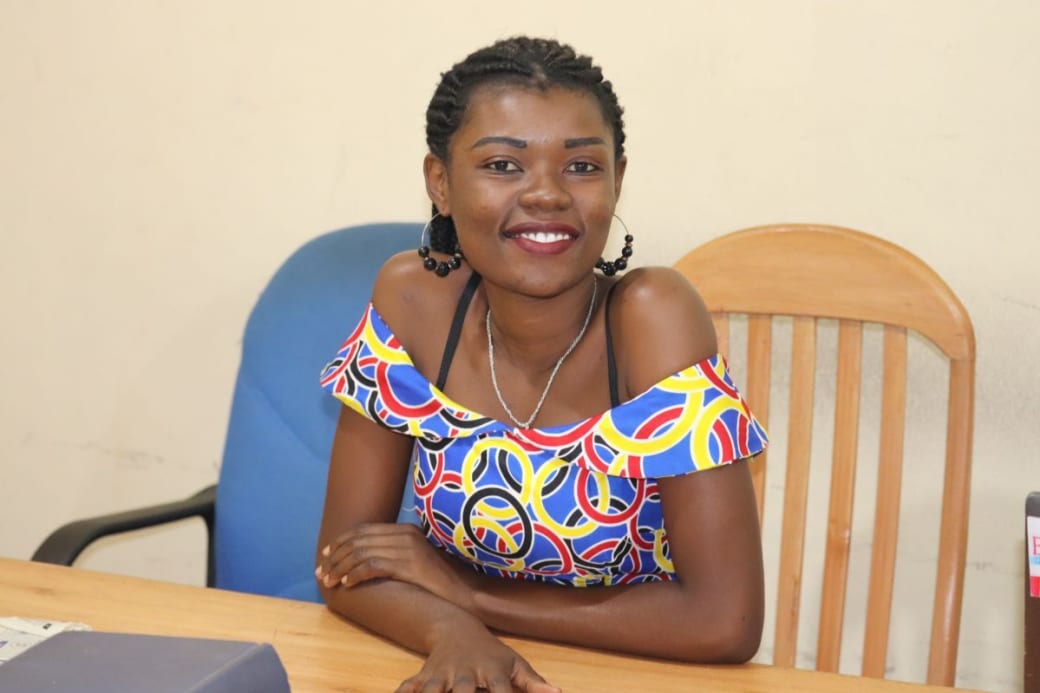
Burundian journalist Joella Niciteretse continues her work from Belgium. ‘The truth about the corrupt government must come to light.’
© Joella Niciteretse
Joella Niciteretse (31) grew up in Burundi. From an early age, she became fascinated by language and stories. Her uncles, both journalists, inspired her to pursue her dreams and planted the seed for her journalism career.
‘Today, Burundi is a country full of journalists who are not worthy of their title,’ Joella drops in straight away. ‘Everyone there realises that a good journalist is a living journalist, and that if you want to make money, it’s best not to do anything the dictator doesn’t like.’ She is referring to President Évariste Ndayishim, who has been in power since 2020.
Ndayishim continues the repressive policies of his predecessor, Pierre Nkurunziza. The latter sharply reduced press freedom in Burundi after a political crisis in 2015. Even now, journalists in Burundi who expose corruption, human rights violations or mismanagement face real danger to their lives.
Joella is convinced that in the coming years, journalism in her home country will be dominated mainly by followers of the regime. ‘I don’t blame them. Food prices in Burundi are skyrocketing, brothers and sisters can no longer provide for their families and wages are not keeping up with inflation. Everyone is just trying to survive.’
The price of truth
It could have been the same for Joella, but she chose a different path. ‘It was not easy to get started as a woman in the world of journalism in Burundi. That world there is largely dominated by men and you could easily be tempted to go along with the propaganda.’ Nevertheless, she persevered tenaciously and became a successful investigative journalist.
Early in her career, she focused mainly on sports and economics. ‘My father is a sports coach and my mother a businesswoman, so a logical choice.’ Later, she shifted her focus to climate change and women’s rights. ‘I want to show women how they can support themselves and strengthen their position in society.’
But the price of truth is high. In 2023, Joella had to flee her homeland. During a stay in the Netherlands, her mother called from Burundi with a disturbing message: men with wrong intentions were at their door, looking for her. ‘At the time, I was working undercover on a story about illegal money flows in Burundi. My cover had been discovered.’
After her trip to the Netherlands, Joella was supposed to go on to Indonesia to get her master’s degree in sports psychology. She had to abandon that dream. Instead, an uncertain period followed. ‘I had no idea what would happen to me. Everything was so uncertain and that gave me a lot of stress.’
Fighting from a distance
She eventually found safety in Belgium, where she was recognised as a refugee in December 2024. Since then, she has lived here in exile. ‘No one here in Belgium understands the hell I went through, but here no one will threaten me. It will be some time before I will call Belgium a new home, but I will get there.’
Also from Belgium, Joella is trying to raise the issue of corruption in Burundi. Together with another refugee Burundian journalist living in France, she is working on an article about the structural shortages of water and electricity in their homeland. ‘My country is bursting with resources, so how can it be that we have constant shortages? That can’t be right.’
But it is not easy to work on such a delicate subject from a great distance. Finding witnesses is difficult, reliable sources even more so. ‘Fortunately in Belgium there is freedom of speech, which is already quite an improvement compared to back home.’
Nevertheless, she misses Burundi. Her family and friends stayed behind there and it is difficult to keep in touch with them. ‘We video call each other, but I can’t visit them in Burundi yet. It is too dangerous. The plan, though, is to travel to a neighbouring country next summer and meet them there.’
Yet one day, Joella hopes to return to her homeland for good. She is studying again, with a future in education and women’s empowerment in mind. ‘My father always told me, “A successful woman is a financially independent woman”. I would like to instil that in others too.’
‘For now, things are still bad in Burundi, but I hope that one day Burundians will come together and take to the streets to address the situation in my homeland. The truth about the corrupt government must come to light. And when that happens, it will hit harder than during the 2015 protests.’
‘I miss Venezuela, but I don’t know if I belong there anymore’
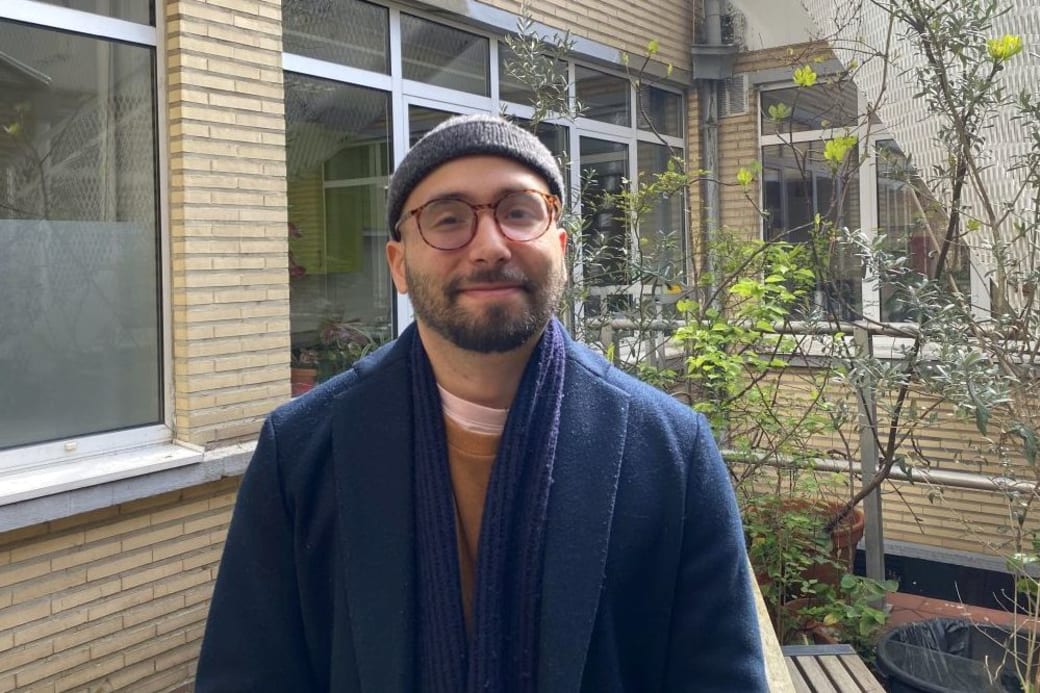
Luis was hit by a police car during a protest in 2019. ‘They drove straight into the protesting crowd.’
© Myrthe Higgins
Luis Miguel Cáceres (31) was born in the politically unstable Venezuela of the 1990s. Ever since he was young, the good-humoured journalist has always wanted to know about ‘the truth’. Years later, he has emerged as a successful photojournalist, whose pictures depict the messy reality in Venezuela.
His first encounter with photography Luis remembers as if it were yesterday: ‘It was like falling in love: I saw it, it saw me and it clicked immediately.’ The spark struck during the mass protests in 2014. Luis, then 19, was part of the crowd that demonstrated against President Nicolás Maduro and his regime. ‘I walked along in the protest and soon realised that I could and should do more. I had a camera and a mission. That started everything.’
For eight years, Luis recorded just about everything that was going on in Venezuela. ‘I wanted to uncover the truth and inform people. Venezuelans needed to know what was going on, and photographs were the best way for me to achieve that.’
But working in Venezuela is not without danger. Journalists who report critically on the government there are systematically harassed, threatened or arrested. Already under former president Hugo Chávez, and certainly under current president Maduro, the government has curtailed media freedom by revoking broadcasting licences, censoring journalists and cracking down on any critical voice.
Since the July 2024 presidential election, many human rights activists and journalists have again left the country in search of safer places. Journalists in Venezuela risk violence by both state security forces and armed civilian groups, so-called “colectivos”, loyal to the government.
Luis also faced this. ‘As soon as the police saw a camera, they tried to rob you or pick you up. That’s why we always worked in groups of three for extra security.’
‘But even that was no guarantee.’ In April 2019, Luis was hit by a police car during a protest. ‘They drove straight into the demonstrating crowd, but to be honest, this did not make a big impression on me. That was just the reality for journalists in my homeland at the time.’
No future
Shortly after opposition leader Guaidó’s failed power grab in 2019, the Venezuelan government became more aggressive towards journalists. From his sickbed, Luis published the images he took during the protests. Not long after, his friends and family were harassed by government agencies.
‘At that moment, I knew I had to leave Venezuela. There was no future for me and my surroundings were in danger.’ In May 2019, Luis fled to Belgium. His family and friends remained behind in Venezuela.
Six years later, the good-humoured journalist has largely accepted his life in exile. ‘When I came to Belgium, I still had a Venezuelan fire in me. But that has since been extinguished somewhat. I miss the food, the sun and my friends and family, but I don’t see myself living there like I used to. I myself have changed, but my homeland is also completely different from six years ago. I don’t know if I still belong there.’
Today his focus is on sports photography, but Luis’ boyhood dream of one day becoming a war photographer remains. ‘For that, you need to have knowledge of all types of photography. I possess that largely thanks to my experience in Venezuela, but sports was still missing from the list.’ Occasionally, he still reports on protests in Belgium, but they are much less violent than in Venezuela.
Luis no longer reports news from his homeland. Not because he doesn’t want to, but because he simply cannot be on the spot with his camera. Still, he remains hopeful about journalism in Venezuela. ‘The journalists there are afraid, but they are even more afraid of what would follow if the truth did not come to light. That fear makes them stronger and braver than ever. And they will continue to get stronger and braver, I’m sure.’
‘Until the regime falls, I can’t go back’
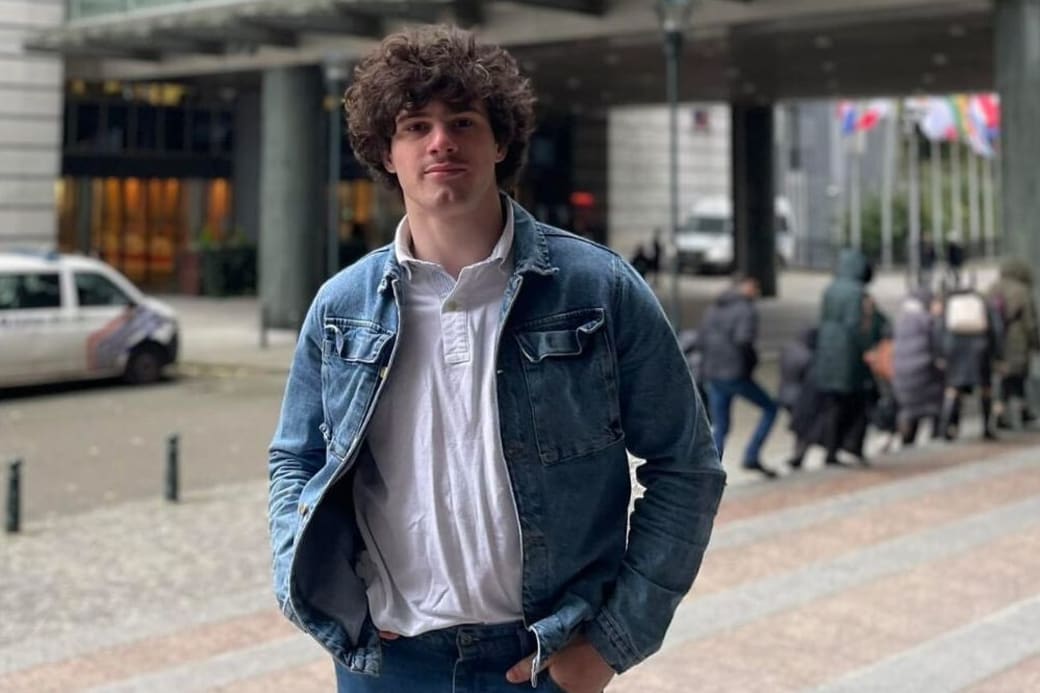
© Lucas Ablotia
At the age of 18, Lucas Ablotia (now 20) left Georgia for Brussels all alone. He had to leave his family behind, as countless hate reactions and death threats were hurled at his head in his homeland. Not because he had done anything wrong, but because he is openly part of the lgbtqia+ community and does not always agree with the Georgian government, which is controlled by Russia.
Today Lucas is studying Law at the university in Brussels, but two years ago he was still on his way to becoming a journalist in his homeland. ‘I always wanted to become a journalist. I grew up in Russian-occupied territory in Georgia, and for me, journalism became a way to address the injustices in my country.’
‘I received hundreds of messages, accusations and even death threats.’
From a young age, Lucas made videos on social media. As a result, he soon gathered a loyal following of followers. But when he came out of the closet at the age of 16, hate messages poured in en masse. ‘I received hundreds of messages, accusations and even death threats. That was a difficult period for both me and my family.’
His outspoken views on lgbtqia+ rights, his criticism of the pro-Russian church and the anything but democratic Georgian government put him in danger. When an interviewee died shortly after an interview with Lucas and threats escalated after Pride Month, he knew he had to leave. ‘I was living in constant fear. The regime kept trying to intimidate me and I had to think of my own safety.’
Such intimidation is not new. In Georgia, the situation for journalists has become increasingly worrying in recent years, especially for those who criticise the pro-Russian direction of the government and the Orthodox Church. Critical journalists like Lucas there face intimidation, legal persecution or physical attacks.
Georgia’s lhbtqia+ community also gets a hard time. Homophobic statements and hate speech are often ignored and even encouraged in certain political circles.
In September last year, the Georgian parliament passed anti-lgbt amendments that ‘impose discriminatory restrictions on the right to education, health, freedom of expression and peaceful assembly’, Human Right Watch stated in its latest World Report. Those amendments ‘also prohibit positive references to lgbt individuals in literature, film and media.’
Safety is no guarantee
‘In the beginning it was tough,’ Lucas recalls of his arrival in Belgium. ‘Everything was unfamiliar. I didn’t know the language, I didn’t find a job quickly and I didn’t know anyone. But I am grateful. Belgium gave me security.’ Eight months ago, his mother and younger sister were also able to come to Brussels. ‘Since their arrival, it already feels more like home, a bit like Georgia. I hope they will also be allowed to stay.’
Yet even in Belgium, his safety is not guaranteed. A few months ago, Lucas and a friend were attacked on a Brussels bus because of their sexual orientation. ‘We like to think that Western countries, like Belgium, are very progressive in terms of lhbtqia+ rights, but too often forget that homophobia and violent discrimination are also present here.’
The attack brought old traumas back to the surface. ‘I was scared, but optimistic at the same time. I am no longer the child without experience. I can change something now.’
A new life
In Belgium, Lucas, along with at least 86 other journalists, will have the chance to build a new life in exile. ‘We have to stick together and support each other. Find people we can trust and who understand what we went through. We are living in exile, yes. But we can continue our work here.’
He may now be studying Law, but Lucas continues to work on journalistic products even in exile. Including for Latitudes, a Belgian news platform for journalists in exile. ‘Initially I wrote about Georgia, but now I focus more on personal stories of people who I think really matter. For example, I am currently following a transgender woman who served in the Georgian army for 15 years.’
When developing those journalistic pieces, objectivity is essential for Lucas. ‘I have been a victim of propaganda articles myself. I know what it does when people write about you with prejudice. It left me with several traumas. That’s why I now try to remain as objective as possible myself.’
For that objectivity, of course, you need reliable sources. ‘My contacts in Georgia are all against the regime and dare to speak out. Preferably as loudly as possible.’ They keep in touch via encrypted messaging software such as Telegram and Signal.
Journalistic future in Georgia
Despite everything, Lucas still hopes to return to his homeland. He misses his grandmother the most. ‘It has now been more than three years since we saw each other. We still video call occasionally, but I miss her love and the traditional food she prepares so well.’
But returning to Georgia is proving to be no easy matter. ‘If I return, I have to change. Homosexuality is not accepted in my home country and with that, I am not accepted either. Until the regime falls, I cannot return.’
Should the Georgian regime collapse, Lucas says there is a chance that the media will be able to speak freely again. ‘Now critical voices face threats and critical media are shut down. I try to remain optimistic and I believe the regime will fall. But until that happens, journalists will continue to leave Georgia.’
‘Sometimes I think that autocratic countries where a lot of money is involved, like Georgia, will always be corrupt in a way. If the regime does not fall, it is a possibility that the future of journalism in Georgia will continue only in exile.’
Still, he remains hopeful. ‘Life is a struggle, but change is possible. Also in Georgia. I believe in the new generation (of journalists) in my country. Young people just want to live in freedom and get along peacefully.’
Lucas also wants to address his colleagues in exile: ‘You are not alone. Thank you for continuing your work despite everything. It is difficult, but oh so important.’
‘Everything I lost outweighs giving up my voice’
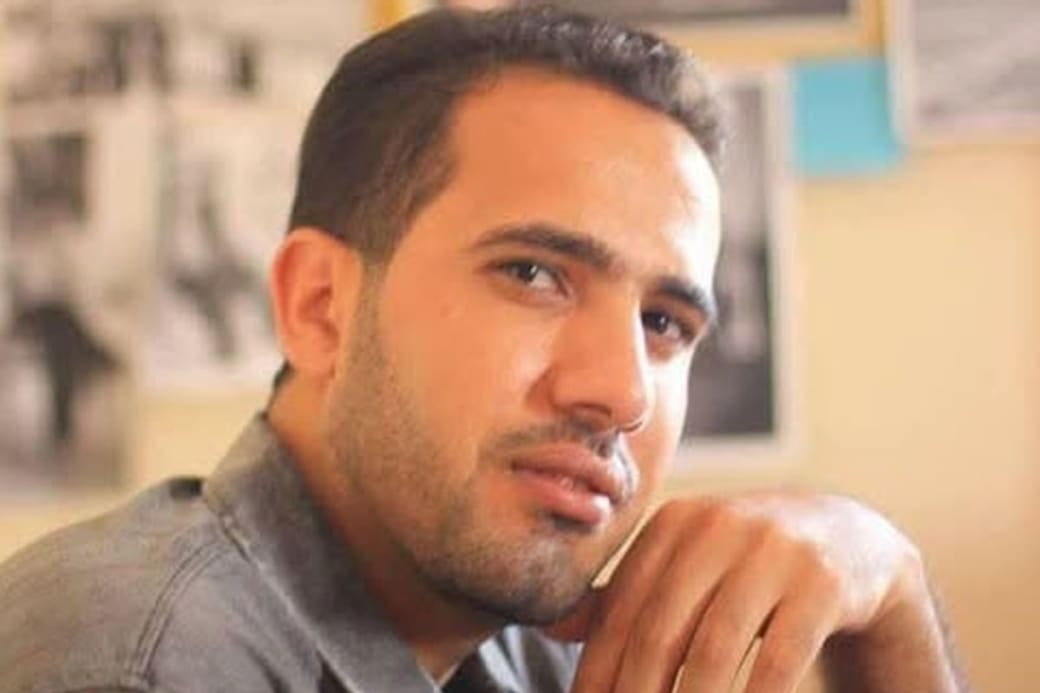
© Tareq Moammer
The journalistic career of Tareq Moammer (38) began in Gaza. He grew up under the Israeli occupation, an experience that will shape him as a journalist. ‘From a young age, I faced injustice, oppression and lacked any kind of fundamental freedom. Early on, I discovered the power of words and images. It felt like my duty to make the voice of my people heard.’
For more than a decade, Tareq worked as a journalist in the Gaza Strip. There, he was a direct witness to the suffering and resilience of the Palestinian people. Despite numerous threats and intimidation, he continued to report. Not only out of a passion, but also out of necessity.
The Israeli attack on Gaza in 2014 was a breaking point. ‘I was confronted with the most heinous crimes against children and women. They were being murdered for no reason. At that moment, I realised that journalism is not just a profession, but a historical mission, a testimony.’
Since then, Tareq has focused on issues of human rights, freedom and social justice, documenting Israeli violations of them. ‘I believe true journalism should always put people at the centre and tell the truth without manipulation or deception.’
Journalists as targets
A journalistic career in Palestine is not without danger. ‘It has always been a life-threatening assignment, with threats from both the Israeli occupation forces and local authorities such as Hamas.’
Freedom of expression is extremely limited there, and arrests and attacks on journalists are part of the daily reality. Since Tareq’s departure in 2018, the situation has only worsened, with a growing number of journalists losing their lives while working.
His decision to leave was not a free choice. ‘Increasing threats, repression and the deteriorating situation for press freedom made further work impossible. It was a painful decision, but necessary to continue my work and keep spreading the voice of my people.’
Today, Tareq lives in Belgium and continues his mission. ‘As long as injustice continues and oppression does not stop, it is my duty to continue documenting and spreading the truth.’ In doing so, he works with human rights organisations, former colleagues and concerned citizens in Palestine who, like him, refuse to remain silent.
‘The biggest challenge? Source protection. Especially under the constant threat of surveillance, manipulation and intimidation. Especially in a context where journalists are often a target.’
Since 7 October 2023, newsrooms have been destroyed and some 200 journalists killed, regrets Reporters Sans Frontières in its latest World Press Freedom Index. ‘They were not hit by chance, but deliberately and systematically murdered, despite the fact that they were clearly identifiable as journalists, for example by clothing labelled “press”. These escalating attacks aimed to silence the truth and prevent the world from witnessing the crimes against Palestinian civilians,’ notes Tareq.
Silence is complicity
‘Journalism has never been just a job for me, but rather a life mission and an ethical legacy,’ says Tareq. ‘In a world where truth is traded, silence is rewarded and the free voice is punished, our duty as journalists remains to be witnesses of pain and guardians of memory.’
‘Everything I have lost outweighs giving up my voice. As long as there are victims, I will keep fighting to make their stories heard. I will keep writing, keep documenting and keep speaking. Because in the presence of injustice, silence is a form of complicity, and the free voice is the last bastion of our threatened humanity,’ he concludes.
 This article was translated from Dutch by kompreno, which provides high-quality, distraction-free journalism in five languages. Partner of the European Press Prize, kompreno curates top stories from 30+ sources across 15 European countries. Join here to support independent journalism.
This article was translated from Dutch by kompreno, which provides high-quality, distraction-free journalism in five languages. Partner of the European Press Prize, kompreno curates top stories from 30+ sources across 15 European countries. Join here to support independent journalism.
The translation is AI-assisted. The original article remains the final version. Despite our efforts to ensure accuracy, some nuances of the original text may not be fully reproduced.
If you are proMO*...
Most of our work is published in Dutch, as a proMO* you will receive mainly Dutch content. That said we are constantly working to improve our translated work. You are always welcome to support us both as a proMO* or by supporting us with a donation. Want to know more? Contact us at promo@mo.be.
You help us grow and ensure that we can spread all our stories for free. You receive MO*Magazine and extra editions four times a year.
You are welcome at our events free of charge and have a chance to win free tickets for concerts, films, festivals and exhibitions.
You can enter into a dialogue with our journalists via a separate Facebook group.
Every month you receive a newsletter with a look behind the scenes.
You follow the authors and topics that interest you and you can keep the best articles for later.
Per month
€4,60
Pay monthly through domiciliation.
Meest gekozen
Per year
€60
Pay annually through domiciliation.
For a year
€65
Pay for one year.
Are you already proMO*
Then log in here